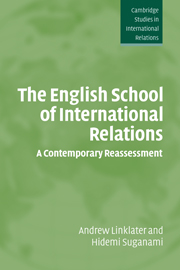Book contents
- Frontmatter
- Contents
- Acknowledgements
- Introduction
- 1 The idea of ‘the English School’ as a historical construct
- 2 The argument of the English School
- 3 The English School on ‘International Relations as an intellectual pursuit’
- 4 Progress and its limits: system, society and community in world politics
- 5 Cosmopolitanism and the harm principle in world politics
- 6 The sociology of states-systems
- 7 The good international citizen and the transformation of international society
- Conclusion
- Bibliography
- Index
- CAMBRIDGE STUDIES IN INTERNATIONAL RELATIONS
4 - Progress and its limits: system, society and community in world politics
Published online by Cambridge University Press: 22 September 2009
- Frontmatter
- Contents
- Acknowledgements
- Introduction
- 1 The idea of ‘the English School’ as a historical construct
- 2 The argument of the English School
- 3 The English School on ‘International Relations as an intellectual pursuit’
- 4 Progress and its limits: system, society and community in world politics
- 5 Cosmopolitanism and the harm principle in world politics
- 6 The sociology of states-systems
- 7 The good international citizen and the transformation of international society
- Conclusion
- Bibliography
- Index
- CAMBRIDGE STUDIES IN INTERNATIONAL RELATIONS
Summary
The English School has been centrally concerned with the study of ‘progress and its limits’ (Mayall, 2000c) and repeated references to the three great traditions of international thought reflect this important fact. The Hobbesian or Machiavellian perspective represents the anti-progressivist approach to international relations which contends that states belong to an international system in which there is seldom relief from competition and conflict. States in this condition are principally orientated towards strategic action – to containing, outmanoeuvring or incapacitating actual or potential adversaries. Most are concerned with maximizing the ‘power to hurt’ and with protecting themselves from the harm opponents can cause (Schelling, 1966). Social learning occurs in the strategic domain most obviously through the accumulation of ever more powerful instruments of violence and the parallel evolution of doctrines about their most effective use. The Kantian tradition represents the progressivist tendency in international thought since its members believe in the existence of a latent community of humankind and are confident that all political actors have the capacity to replace strategic orientations with cosmopolitan political arrangements which are governed by dialogue and consent rather than power and force. Social learning is not restricted to the strategic domain but can unfold in the moral sphere as separate political communities come to identify more strongly with humanity as a whole and weave cosmopolitan principles into the conduct of their external affairs.
- Type
- Chapter
- Information
- The English School of International RelationsA Contemporary Reassessment, pp. 117 - 154Publisher: Cambridge University PressPrint publication year: 2006

